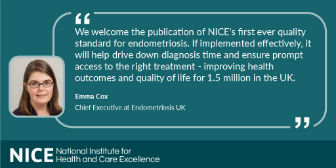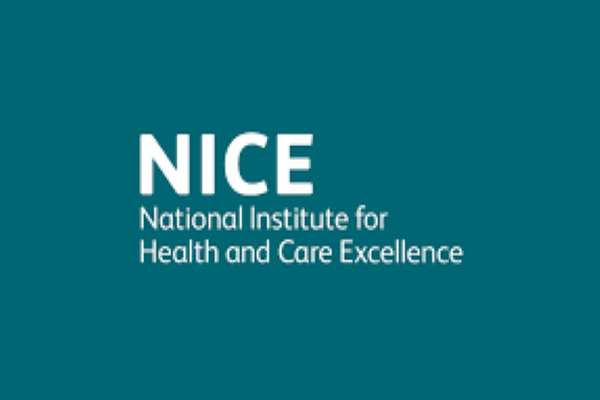The National Institute for Health and Care Excellence (NICE) provides guidance and advice to improve health and social care. The way NICE was established in legislation means that their guidance is officially England-only however, there are agreements to provide certain NICE products and services to Wales, Scotland and Northern Ireland. Decisions on how NICE guidance applies in these countries are made by the devolved administrations, who are often involved and consulted with in the development of NICE guidance. More information about NICE can be found on their website.
Quality Standards for Endometriosis

NICE quality standards describe high-priority areas for quality improvement in a defined care or service area. Each standard consists of a prioritised set of specific, concise and measurable statements. NICE quality standards draw on existing NICE or NICE-accredited guidance that provides an underpinning, comprehensive set of recommendations, and are designed to support the measurement of improvement.
NICE issued Quality Standards on Endometriosis in August 2018, aimed at ensuring the NICE Guidelines on Endometriosis are implemented. They comprise 3 quality statements, along with the impact they should have, what would need to be in place to ensure they were met, and how they can be measured. These are the first ever set of Quality Standards for Endometriosis and will be reviewed every two years, so as services improve the Quality Standards can also be developed to address other areas.
Three quality statements were developed (see below), with the aim of improving diagnosis and ensuring prompt and appropriate referral to secondary care – including being very clear that those diagnosed with or suspected to have deep endometriosis (eg affecting the bowel or bladder) are referred directly to a specialist endometriosis centre. For successful implementation, all medical practitioners who might come into contact with those who could have endometriosis - GPs and practices nurses, school health services, sexual health clinics, and emergency departments - will have to know the signs and symptoms on endometriosis, which would be a great step forward in improving diagnosis and support.
Quality statements
Statement 1 Women presenting with suspected endometriosis have an abdominal and, if appropriate, a pelvic examination.
Statement 2 Women are referred to a gynaecology service if initial hormonal treatment for endometriosis is not effective, not tolerated or contraindicated.
Statement 3 Women with suspected or confirmed deep endometriosis involving the bowel, bladder or ureter are referred to a specialist endometriosis service.
How can I use these to help with diagnosis?
As a patient, you can review the quality standards along with the NICE Guidelines on Endometriosis and raise with your GP or consultant if you feel they are not being followed. For example:
- being referred by your GP directly to a specialist endometriosis centre if you have or may have endometriosis impacting on the bowel, bladder or ureter;
- being referred by your GP directly to a gynaecologist if you have endometriosis or symptoms and are trying to conceive.
- being referred by your GP to a gynaecologist if the initial hormonal treatment your GP tries does not work within 6 months.
NICE Guidelines on Endometriosis

NICE – the National Institute for Health and Care Excellence - issued a new guideline on endometriosis in September 2017. The guideline, Endometriosis: diagnosis and management, covers diagnosing and managing endometriosis and aims to raise awareness of the symptoms of endometriosis, and to provide clear advice on what action to take when those with signs and symptoms first present in healthcare settings. It also provides advice on the range of treatments available. Produced to improve care and care pathways in the NHS, they can also be used by patients to understand what to expect with the treatment and management of endometriosis.
In the months ahead we will be working:
- to raise awareness and educate GPs
- with the RCOG (Royal College of Obstetrics and Gynaecology) and BSGE (British Society for Gynaecological Endoscopy), to define competencies and training for gynaecologists with a special interest in endometriosis
- to help the NHS understand the issues the need for enough time for endometriosis diagnostic and treatment surgery is scheduled in hospitals – so if a consultation or surgery is needed there are not long delays
- for each of the 4 nations in the UK needs to adopt the guidelines, so Northern Ireland, Scotland and Wales as well England. Of course, these nations have a chance to improve on the guidelines where they can, but there should not be a lower standard of care
- to continue to raise public awareness


